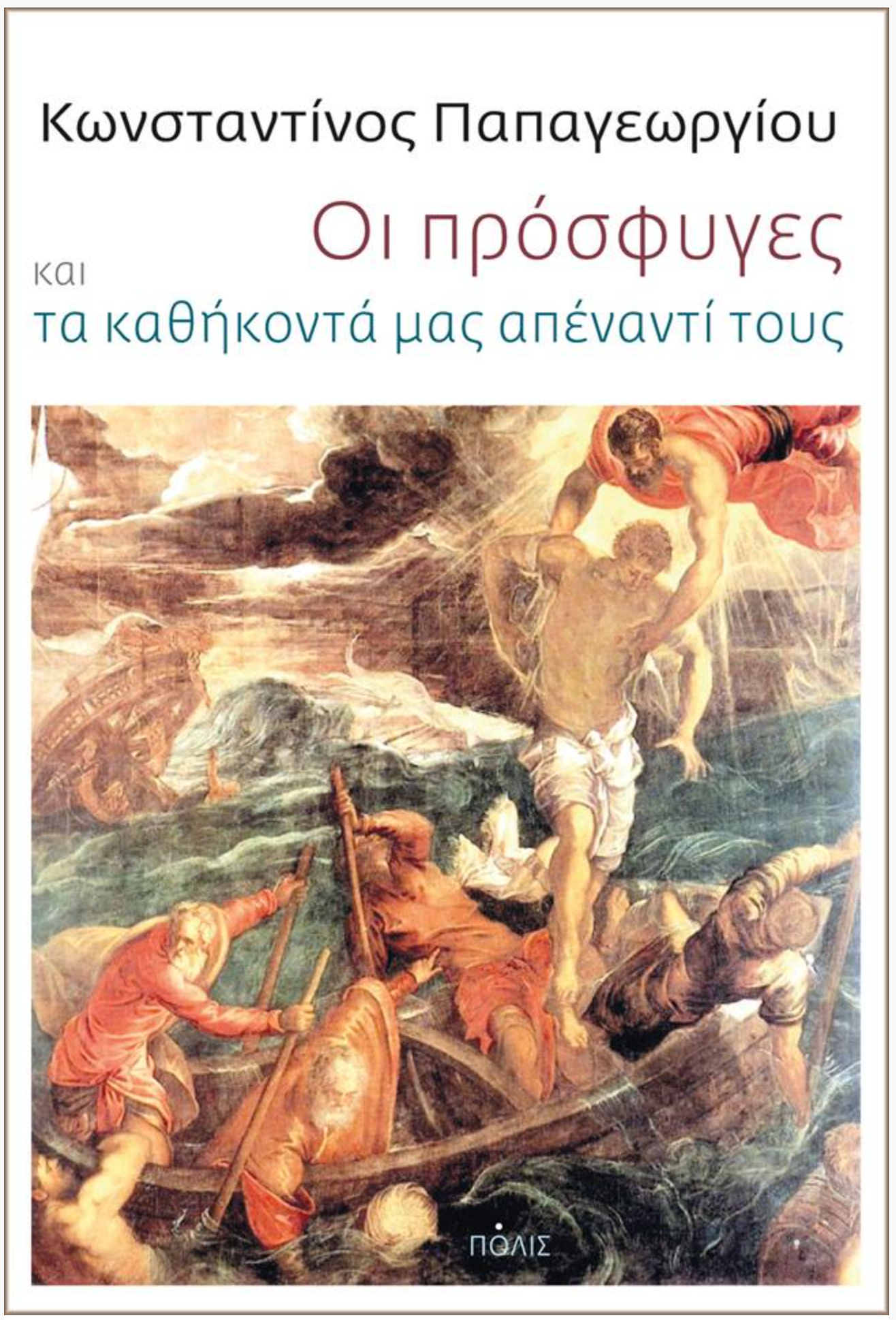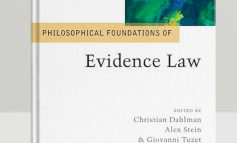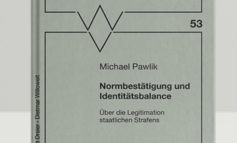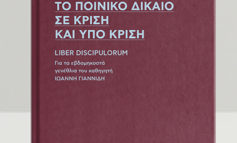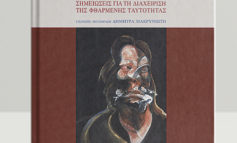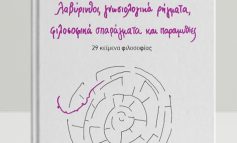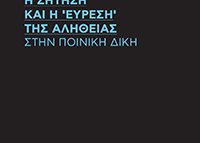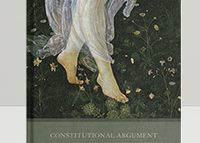In his latest book, Konstantinos Papageorgiou seeks the foundations of our ethical duties towards the refugees, highlighting their civic dimension.
The author's starting point is a fundamental Kantian premise. The rational nature of human beings, as persons capable of lending value to their life, cultivating a sense of justice and goodness, but also incurring injury and insults, creates ethical obligations as to the conduct of each one of us towards every other human being, whom we recognise as being equally an entity of rational nature and self-worth. These obligations certainly include a basic duty to provide assistance when we come across people who are in grave danger. This fundamental duty is often fulfilled via the institutional intervention of the state, as a collective entity that undertakes action. The author's question is: Is such a duty the only basis of our ethical obligations towards the refugees who seek our protection?
Why is that question of interest? In practice, because such a foundation would justify a limited form of assistance only, to avert grave danger that threatens survival itself. In theory, because a purely humanitarian foundation considers such a duty as an exceptional circumstance, in deviation from our core duties, those towards the civic community to which we belong. Indeed, a basic element of our historical evolution is that today the main entity protecting our freedoms is the state. How then is the recognition of a deeper nexus of ethical obligations of our civic community towards the refugees related to the premise that it is the responsibility of their civic communities to offer them the necessary protection? And how is this related to the primary responsibility of our civic community towards its own members?
I (a). Axiology and Practical Reason
Before we consider the answer offered by the author, it would be useful to draw the reader's attention to a fundamental misconception afflicting our collective ethical horizon. We often think that the basis of practical discourse is axiology. Recognition of certain values allegedly entails a general duty to advance them. The role of law is supposed to be the determination of subsidiary duties of advancement, often following the structuring of values in a so-called order of values. However, this perception (which unfortunately seems particularly prevalent in continental constitutional law) is incompatible with fundamental ideas of modernity, especially with the principles of freedom and equality as basic pillars of public discourse.
Let us limit ourselves to two cardinal problems. The first arises from the critique on the heteronomy of values[1]. In free societies we cannot assume that values have a metaphysical foundation that is then imposed upon our rational volition. On the contrary, they are the product of a dialectical recognition by rational beings in a context of equality and freedom. Further, the nexus of goods that we recognise as worthy of advancement in our life is "product" of our exercise of rational freedom and has a strongly personal character - it is value that we ourselves lend to our life. The second difficulty is related to the special, interpersonal nature of morality as a field of obligations towards others, to which rights usually correspond. The crucial element here is not so much the subsidiary values or the good that the persons involved seek. Rather, the pertinent issue is a correct understanding of the ethical relationship between persons who are both capable of lending value to their life. Given that, the determination of these duties and rights is directly related to the particular relationship between the persons and institutions involved. The state as carrier of the collective authority of free citizens has certain duties towards its citizens qua citizens; persons as carriers of autonomous volition have certain duties in their mutual relations, and so on.
Therefore, the vital question is not to seek for certain values that will answer our queries, against which we must all supposedly take a stance as servants of value. Rather, the question is to comprehend our ethical-political relationship, as members of certain civic communities, towards the refugees as persons who are being persecuted in their communities on political or civic grounds, while those communities participate in the persecution or are unable to protect them.
II. The Answer
Let us return to the book at hand. The starting point for resolving the issue is the premise that all us humans have a fundamental interest (a right, according to the author) to work together for a common cause of political organisation with people with whom we share common objectives - of course, also undertaking commitments as to attaining such objectives. In this manner, we participate in the public good of living in a "uniform, free and sovereign civic community and a worthy common life in the sense that it protects our rights and advances our freedom" (p. 56).
The author's crucial position is that the "same" reasons that form the basis of our civic duties towards our own civic community and our fellow citizens also form the basis of our duties towards the refugees. How is this explained?
Evidently, we must accept a respective fundamental right of participation in a civic framework of freedom and justice for every other person. By extension, we must, firstly, abstain from acts that assail or undermine the advancement of that fundamental interest on their part; and secondly, we must provide assistance when they are unable to remain within a civic organisation capable of protecting their freedom. These duties, the author concludes, are duties that we have as citizens against people in their capacity not only as persons whose basic rights are under threat, but also as "citizens" who have been deprived of civic constitution and protection (p. 63).
These duties are duties of justice. If I correctly understand the author, they are duties that we "owe" to the refugees. They correspond to "rights" they have. If we violate them, we are being unfair towards them. And they are based on their nature as beings with a fundamental ethical interest of living in a political community of freedom and equality.
Papageorgiou, however, does not conclude his argument there. He also asks whether our stance against the refugees also concerns the "ethos" of our democratic community. He focuses on the attitude with which we fulfil our duties and the motive that our actions imply. These reveal, he aptly tells us, our collective self. Arrogance or disdain for the refugees suggests a defect. They come into conflict with the aims of our collective striving for perfection. And he concludes that views that perceive our society as a victim of exploitation by the refugees undermine the deeper ideas of democracy and critical examination that democracy requires in its public discourse.
III. Evaluation
The book undoubtedly stands out for its internal coherence and its reasoning. Its contribution is also particularly important. As far as I can judge, advancement of the political dimension of our duties, and especially the focus on the fundamental interest of the refugees to live within civic structures of freedom and solidarity, an interest that has been compromised, is an original contribution to the literature, both Greek and international alike.
Essentially, Papageorgiou achieves a double aim. Firstly, he explains the ethical nature of the obligations involved. They are not discretionary obligations dependent on our magnanimity or even on our political virtue, but obligations towards persons who are equal with us as to the above fundamental civic interest. In this, his thinking is an extension on the political level of the fundamental Kantian premise, which bases our ethical duties towards every fellow human being on our common rational nature. He avoids the trap of utilitarianism, which would seek the foundation of the duties involved in an impersonal equal care for the prosperity of every human being. This could be the concern of God, but it is not an ethical injunction for humans living in their own organised societies.
Secondly, he explains why our duties towards the refugees, while extending beyond the basic humanitarian duty of deliverance from life-threatening situations, they are not necessarily in conflict with the fundamental interest of safeguarding and advancing our own civic community. Indeed, it is not consistent for us to assert that our democratic duty allows us to leave the refugees to their fate, when their capability to form their own democratic structures has been compromised. "If the common ideals of freedom and justice bring us close together as citizens of a sovereign political entity, the same ideals oblige us to express our solidarity to those who have been deprived of their freedom" (p. 82). A democratic civic community that would not take that into account, would be deficient in integrity.
IV. Specification
Of course further questions remain, related to the complexity of the problem itself and to the reality before which we are called upon to take a stance as ethical beings. I would like to record here two questions, affecting the scope of the protection required and arising from the idea that such protection aims to substitute for the political solidarity the refugees lack (p. 83).
We recognise that the refugees have a fundamental interest in forming a civic community ensuring freedom in law. We recognise that we must perceive them as being equal to us in that. And we seek terms of collective co-operation, in this case with respect to that capacity. Thence, there arises a duty of respect for their civic organisation, to the degree that it protects freedom in law. Perhaps, there also arises a specific duty to assist foreign states that are subject to conditions not conducive thereto[2].
However, what are the duties that arise towards the person who is persecuted or in danger herself? Evidently, we bear a strict duty not to send her back to her country of origin and generally to refrain from any action that would place her at risk of persecution. But is it our obligation to "substitute" for the responsibility of foreign states as to the provision of solidarity and civic protection in general? And if so, does this obligation imply full substitution regardless of the sacrifice needed?
The answers to these issues are not obvious. To a large extent, they depend on our particular relationship to the refugees. The issue of international protection essentially arises if the refugee is at the borders of our territory or within it. If therefore we are in principle obliged to offer international protection to such persons (because otherwise they would again be exposed to danger), and if this entails the provision of a residence permit, then the further protection provided does indeed have the character of substitution for the responsibility of the refugee's country of origin. A contrary view would lead to unfair discrimination and stigmatizing of people we have accepted as members of our society -even if temporarily- precisely because they have been deprived of their fundamental right to civic solidarity and protection.
If therefore it is a substitution, must it be full substitution? Can the extent and content of the protection they are entitled to (access to employment, education, social welfare, medical care, etc.) be differentiated from what applies to the citizens of the country itself? Here too Papageorgiou draws our attention to an important parameter, i.e. that the refugees have been deprived of their fundamental civic rights. They are thus differentiated from those who have voluntarily chosen a specific foreign country as their place of residence. On the other hand, the provision of international protection remains an exceptional and supplementary process. States are not mere entities of local administration serving the citizens of the world, as free and equal persons. Thus, the political community that offers protection may reasonably invoke the need to respect and preserve its own identity. The civic nature of the obligations towards the refugees does not discredit the fundamental interest of every state to preserve its own collective ethos, its own free public culture and its achievements[3].
Therefore, cognizance of our own identity is crucial upon delineating the protection that refugees can "demand" from us. However, this argument also applies in reverse. Our political identity of freedom and justice in law and the ways in which we collectively practice it, are also pertinent in reinforcing the protection we are willing to offer. The duties we assume, writes Papageorgiou, reveal our own civic ethos. Of course, this insight indicates how important it is that our compliance with the duty of assistance be made consciously and for the right reasons. In my opinion, it also reveals something else: we have reasons to offer further assistance, beyond what the refugees can "demand" from us. Such reasons rest upon the ideals for the perfection of our own civic community. Their pursuit honours the virtue of sustaining the well-ordered communities we boast we have attained[4].
NOTES
[1] For an overview, see the excellent analysis by John Rawls, Lectures on the History of Moral Philosophy (Harvard, 2000), p. 226 et sec. In Greek bibliography, see Pavlos Sourlas, Δίκαιο και Δικανική Κρίση (2017), p. 353 et sec.
[2] In general, cf. John Rawls, The Law of Peoples (Harvard, 1999), p. 105 et seq.
[3] See J. Rawls, op. cit. p 34-35.
[4] This view is also crucial for yet another dimension of the refugee issue. It reveals the disgraceful nature of the practices applied by the western world in order to discourage refugees from knocking on our door. Often, of course, these practices violate specific duties as well (e.g. repulsion by force of a boat carrying refugees so that it will return to a country incapable of offering protection).



